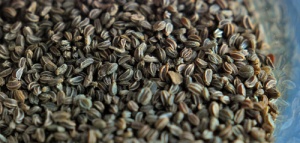Celery Seed Oil
From Wikiwel
Other Names: Aches des Marais, Ajamoda, Ajmoda, Ajwan, Apii Frutus, Apio, Apium graveolens, Céleri, Celery Fruit, Celery Seed, Fruit de Celeri, Graine de Céleri, Karmauli, Persil des Marais, Qin Cai, Smallage, Selleriefruchte, Selleriesamen.
See also : Celery
Special Precautions of Celery Seed Oil
- Essential Oil contains myrcene, which is known to cause cancer
- If you are pregnant or nursing, avoid this oil and consult your doctor first because it is known to induce menstruation.
- There are some people who have strong allergic reactions to celery in food. Celery allergy seems to be far more common in central Europe, mainly France, Switzerland and Germany, and less so in the UK and U.S., where peanut allergy is the most common. It is one of a small number of foods that can cause severe allergic reactions. These reactions are less common than peanut allergy. People with celery allergy can experience potentially fatal anaphylactic shock when exposed to celery.
- Cooking celery does not destroy the proteins which cause the allergic reaction. Celery root, commonly eaten as celeriac, or put into drinks, is known to contain more allergen than the stalk, however the seeds contain the highest levels of allergen content. Dried celery or spice is also highly allergenic and likely to cause a reaction if a person is sensitive to raw celery. Some people who are allergic to birch pollen may also be allergic to celery seed.
- Thus, if you aren’t allergic to celery in its whole form, then you probably won’t be allergic to celery seed oil. However, it is always wise when trying an essential oil for the first time to proceed carefully just in case you might have a rare allergic reaction. Start by simply sniffing the oil while it is still in the bottle and watch for a reaction.
- Look for tingling and itching sensations of the nose, mouth, and throat, which often appear in a few minutes. Raised bumps and itching can also appear on the face and eyelids. A skin rash and swelling may also occur. Extreme swelling of the throat may cause constriction of the airways, which can result in breathing difficulties. If this happens, seek medical attention.
Health Benefits and uses of Celery Seed Oil are
- Celery essential oil has been shown to have antifungal activity. It is also active against many bacteria including: Staphylococcus aureus, Staphylococcus albus, Shigella dysenteriae, Salmonella typhi, Streptococcus faecalis, Streptococcus pyogenes, and Pseudomonas solanacearum.
- Phthalides and other compounds of celery seed oil have potential value for the treatment of hypertension and heart ailments. 3-n-butyl phthalide is also reported to be a muscle relaxant. Phthalides have been reported to have sedative and anticonvulsant activity in mice. The oil has hypoglycemic activity.
- Heals Liver Damage : Researchers gave oral celery seed oil extract to the damaged rats at small cumulative doses (50 µl/kg of body weight for 6 weeks). They found that celery seed oil ameliorated the toxicological effects of DEHP, which was revealed in improved lipid profile, restored liver functions, improved vascular oxidative stress and inhibition of oxidative damage to lipids.
- stomach Ulcers : A study investigated the ability of two celery extracts to reduce stomach lesions (ulcers) in rats, and to reduce bacterial activity in the stomach : Their results also showed that celery seed oil strongly inhibited the activity of Escherichia coli and was moderately inhibitory against Pseudomonas aeruginosa and Staphylococcus aureus.
- Reduces Cancer : Phthalides are highly bioactive compounds extracted from celery. They provide protection against cancer and various other conditions. Sedanolide has been reported to be the most active of the phthalides, and has been shown to reduce tumors in laboratory animals.
- Reduces Inflammation and Pain of Arthritis
- Celery Seed Extract is effective for treatment after stroke.
References
- Cui LY, Zhu YC, Gao S, Wang JM, Peng B, Ni J, Zhou LX, He J, Ma XQ. Ninety-day administration of dl-3-n-butylphthalide for acute ischemic stroke: a randomized, double-blind trial. Chin Med J (Engl). 2013;126(18):3405-10. http://www.cmj.org/ch/index.aspx
- Zhang J, Yang J, Chang X, Zhang C, Zhou H, Liu M. Ozagrel for acute ischemic stroke: a meta-analysis of data from randomized controlled trials. Neurol Res. 2012 May;34(4):346-53. doi: 10.1179/1743132812Y.0000000022.
